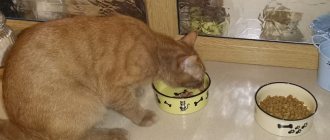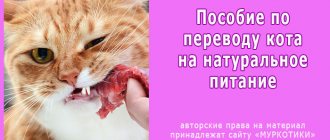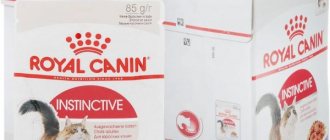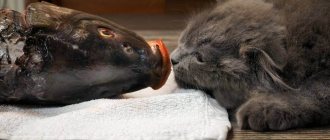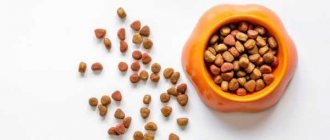Mixed food is dangerous for the stomach and intestines, so veterinarians strongly recommend using only one type of food: natural or ready-made.
Despite this, it is not possible to choose a convenient option right away. For this reason, owners have to engage in retraining, which does not always go smoothly. Below you can find out how to switch a kitten or an adult animal to dry food and what to do in case of a hunger strike.
Benefits of dry food
The best food for a cat is mice and birds. It is clear that it is impossible to afford this in an urban environment. And so balancing the diet in order to calculate the required level of proteins, carbohydrates, fats, vitamins, taurine is also not always possible. Industrial food is convenient in this regard, because manufacturers offer ready-made diets that do not require supplementation with vitamins and other products. And the better the quality of the diet, the closer it is to “natural” food - birds and mice.
The second advantage of a dry ready-made diet is ease of feeding. It is enough to measure the dose of croquettes in accordance with the instructions, age, weight of the pet and pour into a bowl.
A wide range of products is also a plus. It is easy to choose a product depending on age, health status, and physiological characteristics. After all, for cats suffering from urolithiasis who have undergone sterilization or castration, switching to dry food is the only way to maintain health. The same goes for animals with allergies, for whom hypoallergenic food is prescribed as treatment.
Recipes for cats
Required:
- 1 kg of meat;
- 500 gr. vegetables that your pet prefers;
- 2 tbsp. spoons of a mixture of 5 cereals.
Preparation:
- It is necessary to boil the meat until cooked, then remove it and leave to cool.
- Boil the vegetables in the resulting broth until half cooked.
- Pour the broth over the flakes and let it brew.
- When the grains are ready, place them and the vegetables in a blender and blend well.
- Cut the meat into small, uniform pieces that are convenient for your cat to eat.
- Mix the resulting mass from the blender and chopped meat, add 300 ml of broth.
Our dish is ready! It can be immediately divided into small portions for your cat to eat and frozen in the freezer.
Lazy dumplings
Required:
- 1 glass of purified water;
- 2 eggs;
- 500 gr. wheat or corn flour;
- 300 gr. chicken liver.
READ What should cats eat with kidney failure?
Preparation:
- Grind the raw liver in a blender or grind through a meat grinder.
- Mix water, eggs, flour and the resulting liver mixture.
- Mix the dough.
- The consistency of the mixture should be very soft.
- Roll out a long sausage and cut into small pieces that look like cherries.
- Next, we place our pieces in boiling water, and as soon as they float to the surface, they can be removed.
It is better to cook for 1-2 servings. The rest of the mixture can be placed in the refrigerator. Cool the resulting lazy dumplings and, while warm, serve to the cat.
What to consider when switching to dry food
Adult cats get used to the structure and consistency of their food. Therefore, if you simply put a bowl of granules in front of your pet, at least it will cause him confusion. When changing the type of food, it is important to follow a number of recommendations.
Select food
The first step you need to take before teaching your cat to eat dry food is to choose a brand. Veterinarians recommend a product from the super premium or holistic line. Their main advantage is the high content of meat ingredients. The cat will happily switch to cheap food on its own. Since the manufacturer does not regret adding tempting flavors to the composition. But there is no benefit from such products.
One of the criteria for good food is the daily requirement. The lower the manufacturer declares the daily dose, the better the product. This means that it contains few “unnecessary” components for the cat’s body.
Be patient
The cat may resist switching to a ready-made diet and plaintively beg for its usual food. The owner should be patient with the pet. And under no circumstances should you scold a cat. He will never understand why he is being scolded. He will associate new food with negative emotions.
During the transition period, it is advisable to exclude treats, even if the cat is accustomed to them. He must "focus" on the new diet.
Translate gradually
The key to success in accustoming to a new food is a gradual transition. You cannot be guided by the statement - “if he wants, he will eat.” You need to gradually replace your usual food with a new one. The fact is that with a sharp change in the moisture content of food (and there is no moisture in dry granules), the acidity of gastric juice changes. It becomes less concentrated and more liquid. The composition of bile produced by the liver and the concentration of enzymes in the pancreas change. The intestines are overloaded and the process of digesting food is disrupted, which affects the liver, pancreas and stomach. The risk of constipation increases.
You cannot force a cat to starve. If your pet goes without food for a long time (more than 48 hours), there is a risk of developing lipidosis - fatty liver disease. This is especially true for obese animals.
Eliminate stress
You should not start switching your cat to a ready-made diet in stressful situations: routine vaccination, a trip out of town for a while, the appearance of new pets in the house.
Why transfer an animal to drying: pros and cons
Dry food is often viewed with skepticism, as many owners are sure that such food causes urolithiasis. In fact, kidney stones are formed due to insufficient fluid intake or low-quality products. The main disadvantages of “drying” are associated specifically with economy class.
If you choose food thoughtfully and correctly, you can find the following advantages:
- variety of lines (food for kittens, pregnant women, the elderly, castrates, allergy sufferers);
- balanced composition that does not require independent calculation of BZHU;
- saving time;
- no risk of parasite infection;
- prevention of tartar formation.
If we put aside banal convenience, then the main reasons for the forced transfer to “drying” are illnesses and excess weight. The menu of a therapeutic diet with natural products is usually very meager and takes a lot of time to prepare, so most veterinarians recommend not torturing yourself and your pet - and just buy the right food.
Strategy for switching from straight sex
Natural food is, as a rule, boiled meat, offal, fermented milk products, boiled vegetables. The croquettes are hard and smell unusual.
To switch your cat to dry food without stress, it is recommended to soak the granules in water or broth for the first time. Just pour in enough liquid to completely cover the croquettes and wait a few minutes. If desired, you can mash with a fork to a puree consistency. Soaked food has a more pronounced aroma, and the texture resembles regular food.
According to reviews from cat breeders, it will take an average of 2 weeks to switch a cat from a natural diet.
The translation itself consists of several stages:
- At the first stage (first 4 days), remove 25% of the daily dose of food and replace it with dry food.
- Second stage (from 5 to 9 days) – 50% of the menu is natural food, 50% is drying.
- The third stage (from 9 to 14 days) - already 75% in the bowl is croquettes and 25% is natural.
- From day 15, the cat’s diet is only factory food.
With a dry diet, the owner needs to forget about feeding the pet with food from the table, even as a treat.
What manufacturers are silent about
When choosing industrial food, you need to be aware of some pitfalls. Manufacturers are often silent about them. Therefore, cats sometimes have to face troubles and endure them steadfastly. There are four important points that the owner should be aware of.
- Regular food is designed for a healthy pet. A sick cat should not be fed regular dry food. This will make the problem worse. The pet must undergo a full examination and receive specific nutrition recommended by the veterinarian. This can be either medicinal food or natural food.
- Your pet may develop allergies. Some unscrupulous producers, trying to increase production volumes, replace meat products with by-products (in middle-class feed) or waste (economy class). It is these products, generously flavored with aromas, flavorings and dyes, that lead to the development of allergies to drying.
- The body may not accept food. Some pets tend to drink little water or have a naturally sensitive digestive tract. Such individual characteristics lead to poor absorption of feed. The consequences can be dire. The cat loses weight, the body does not receive enough nutrients, and diseases begin to develop.
- The animal's teeth may deteriorate. This recommendation applies to all categories of pets. The dry food you give to a small kitten can ruin its bite forever. Therefore, breeders recommend soaking dry pieces. An elderly pet can break its last teeth on hard food. And if you completely abandon dry food in favor of wet food, you will very soon encounter diseases of the oral cavity. Insufficient load on the teeth will lead to the formation of stones, gum atrophy and loosening, and subsequently the loss of fangs.
Veterinarians recommend feeding your cat dry food, but only high quality food. Moreover, it is necessary to select products based on the characteristics and preferences of the pet. And in order not to make a mistake with your choice, you need to visit a doctor every six months and get tested. They will show exactly how much the right diet your tailed furry is getting.
Switching from canned food
It is believed that switching a cat to dry food from wet food is faster than from natural food - on average in 1 week. But everything is individual. For some people, the deadlines may shift, both up and down.
The translation principle is as follows:
- Divide a single dose into 5 parts and remove 1 part, replacing it with croquettes.
- Every day, increase the amount of granules and reduce the share of canned food.
- Calculate the dosage so that by day 7 dry food completely replaces wet food in the bowl.
It is important to take into account the calorie content of the old and new diet. If canned food contained less than 50% meat ingredients, and dry food, on the contrary, is rich in protein, then the time for transition to a new type of food is increased. This is necessary so that the cat’s body “gets used” to producing the required amount of enzymes for processing protein foods.
Advice from cat breeders:
Soak a few granules in the juice from canned food and offer it to the cat in a separate bowl. Some cats, after eating their canned food, go to a nearby bowl to investigate a new “dish” on the menu.
You can also crush the granules and sprinkle them on top of the canned food.
Another option is to add some croquettes to the pouch pieces. Perhaps the cat will eat and lick every drop of canned food, but will not touch the granules. However, he will have the opportunity to become familiar with the texture of the new food.
Example menu
Having selected suitable foods for your cat, look at their calorie content and calculate how many grams of such food can be given to the cat. The calorie content of foods popular with cats is shown in the table.
| Product | Calorie content | Squirrels | Fats | Carbohydrates |
| Chicken fillet | 110 | 23 | 1.2 | |
| Chicken drumstick | 198 | 18 | 14 | |
| Lean beef | 158 | 22.2 | 7.1 | |
| Salmon | 142 | 19.8 | 6.3 | |
| Cod | 78 | 17.7 | 0.7 | |
| Chicken egg | 157 | 12.7 | 10.9 | 0.7 |
| Cottage cheese 5% | 121 | 17.2 | 5.0 | 1.8 |
| Buckwheat | 313 | 12.6 | 3.3 | 62.1 |
| Cereals | 366 | 11.9 | 7.2 | 69.3 |
| Carrot | 32 | 1.3 | 0.1 | 6.9 |
Thus, for the cat Vaska with a daily requirement of 282 kilocalories, you can create the following menu:
- 1st meal: 1 boiled egg, 60 grams of 5% cottage cheese - 141 kcal;
- 2nd meal: 75 grams of boiled chicken fillet, 15 grams of buckwheat, 20 grams of carrots - 141 kcal.
The total is 282 kcal, which is exactly Vasya’s daily requirement. In this case, the ratio of proteins, fats and carbohydrates is 50, 30 and 20 percent, respectively.
Another menu example:
- 1st meal: 100 grams of boiled cod, 20 grams of dry rice - 145 kcal;
- 2nd meal: 90 grams of lean boiled beef - 141 kcal.
Cats' taste preferences vary just like people's. One cat will eat 1-2 types of food and be afraid to try new things, while another will demand a daily variety of food. The owner will have to experiment to find out his cat's favorite foods.
Features of switching to dry food from raw meat
Many owners feed their pets exclusively raw meat. Cats are predators and this diet is more familiar to them. But there is a nuance. To digest meat, some enzymes are produced in the animal’s stomach; others are needed to digest dry product.
Therefore, if you decide to switch your cat to dry food, you should not mix croquettes and meat in the same bowl - the stomach will not be able to cope with digestion. Possible vomiting of food and intestinal upset.
Little tricks
When switching your cat to natural food, be sure to give him probiotics, this will help digestion and make the transition easier. Probiotics can be bought at a veterinary pharmacy, but it is better to first ask your veterinarian which drugs are best for your cat.
When giving natural food, remove it after 20 minutes, no matter whether the cat has eaten or not. During the transition and beyond, always give your cat vitamins. It’s best to ask your veterinarian which vitamins are right for your cat.
It’s best to ask your veterinarian which vitamins are right for your cat.
During the transition and beyond, always give your cat vitamins. It’s best to ask your veterinarian which vitamins are right for your cat.
Biological substances and trace elements
Let's look at the list of biological elements and the products in which they are found. All of the listed substances are extremely important for the active functioning of the pet.
Squirrels
The most important building material for soft and bone tissues. In addition, proteins are converted into additional energy, which is necessary for active animals.
Meat products that contain proteins: chicken, turkey, rabbit. Low-fat fish stands apart. It is better to serve the meat boiled, excluding the bones. Seafood is not a typical cat food. You should not overuse shrimp or mussels. You can pamper your pet no more than once a week.
The necessary microelement can be obtained not only from meat, but also from fermented milk products: low-fat cottage cheese, bifidok, fermented baked milk. If for some reason the cat does not like these products, try egg yolks or semolina porridge.
ATTENTION! Fermented milk products are easily absorbed by the body and have a beneficial effect on microorganisms living in the pet’s digestive tract. Separately, experts note cottage cheese, which is rich in calcium for the growth and strengthening of the pet’s skeletal system
Vitamins
A lack of vitamins weakens the immune system and opens the way to viral diseases. Let's look at products that will help keep your pet in good shape:
- fresh green grass;
- fresh fruits;
- legumes;
- some milk;
- egg yolk.
There are situations when it is not possible to provide your pet with the proper vitamin supplement. In this case, you can go to the pharmacy where you can purchase vitamin complexes. It is better to give them after consultation with a specialist, otherwise hypervitaminosis may develop, which will lead to complications.
Carbohydrates
Carbohydrates are the main energy element that balances a cat’s diet. Most often, plant foods are the source of carbohydrates. Pets are often distrustful of the inclusion of various types of herbs in their predatory diet.
There is some trick: add a drop of vegetable oil to the food or chop the plants into a small salad. As a rule, the animal will not refuse gruel from meat products and greens. Let's note a few foods that are rich in carbohydrates:
- salad;
- broccoli;
- pumpkin;
- beet;
- carrot;
- zucchini.
It is strictly forbidden to give your cat tomatoes or eggplants in any form: raw, stewed, mixed with meat. Abuse can lead to serious food poisoning.
